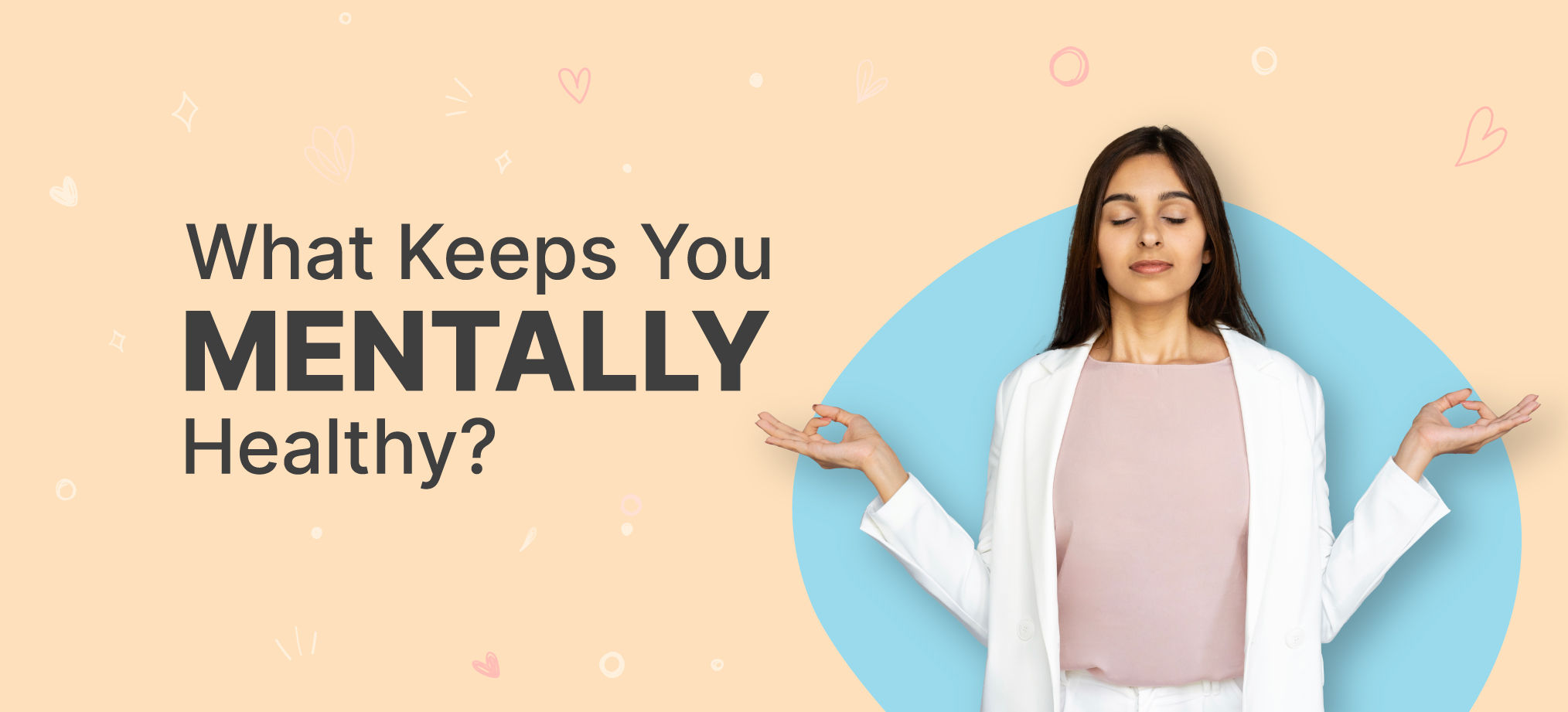Mental Health
How to Care for Your Mental Health and Lead a Better Life
5 min read
By Apollo 24/7, Published on - 06 October 2021, Updated on - 01 November 2022
Share this article
0
23 likes

Did you know?
- Around 1 in 5 of the world's children and adolescents have a mental health problem
- About half of the mental health issues begin before the age of 14
- Mental health problems are one of the leading causes of disability worldwide
- People with severe mental disorders die 10 to 20 years earlier than others
- Mental and neurological disorders make up 10% of the global burden of disease.
What is mental health?
Mental health can be described as the overall emotional and psychological well-being of an individual or group of individuals. Having good mental health has a positive impact on a person’s thinking, feelings, and behavior. It is an essential aspect of a happy and healthy life.
Occasionally, many of us experience occasional mental health concerns. However, when a mental health concern becomes chronic and starts affecting the ability to lead a normal life, it may be an indicator of an underlying mental disorder.
About World Mental Health Day
Every year, 10th October is celebrated as World Mental Health Day to raise awareness about mental illness and its effect on people’s lives worldwide. The day is an initiative of the World Federation for Mental Health (WFMH) and was first celebrated in 1992. The theme for World Mental Health Day this year is “Mental health in an unequal world”. The theme was chosen to highlight the unequal access to mental health services which has grown even more during the pandemic.
According to the WFMH, around 75% to 95% of people with mental health disorders in low- and middle-income countries have no access to mental health services at all. Access to the services does not look better even in high-income countries due to the stigma and discrimination associated with mental illnesses.
Signs of poor mental health
Some of the most common signs and symptoms of poor mental health are:
- Feeling sad and hopeless
- Extreme mood swings
- Excessive anger, fears, and worries
- Difficulty in thinking and concentrating
- Poor changes in eating habits
- Chronic fatigue and tiredness
- Poor sleep patterns
- Withdrawal from friends and favorite activities
- Problems with alcohol or drug use
- Suicidal thoughts.
Impact of COVID-19 on mental health
- Globally, the COVID-19 pandemic has triggered an unprecedented increase in mental health problems. It has taken a massive toll on the physical, social, economical, and mental well-being of people all over the world.
- COVID-19 has disrupted the mental health services in most countries. People with pre-existing mental and neurological problems are facing difficulty in accessing mental health services like counseling, psychotherapy, and medications.
- According to research, people with COVID-19, healthcare providers, and home caregivers are at a greater risk of developing mental health problems like depression, anxiety, post-traumatic stress disorder, and dementia.
- COVID-19 is also taking a heavy toll on the mental health of vulnerable groups, such as elderly people, women, and children. These groups are likely to experience poor mental health outcomes because of various factors including loneliness, social isolation, worsening of cognitive decline, domestic violence, lost opportunities, etc.
Factors responsible for the COVID-19 mental health crisis
COVID-19 has brought about a dramatic change in our lives. Several of the following aspects of the ‘new normal’ are believed to have played a role in triggering the mental health crisis:
- Disruption of normal daily routine
- Fear of contracting the virus
- Restrictions on movement
- Working from home
- Salary cuts
- Unemployment
- Uncertainty of future prospects
- News of death and devastation on social media and TV
- Lack of physical contact with other family members, friends, and colleagues.
Taking care of mental health during the pandemic
-
Focus on positive thoughts
Align your focus on the positive things in life. Make a list of things you are thankful for. Try to maintain a sense of hope, avoid negative speculations, and accept changes as they take place.
-
Maintain a routine
Maintaining a regular schedule is important for good mental health. By sticking to a fixed schedule, you can infuse an element of predictability into your life. Predictability will make you feel more in control of things.
-
Stay physically active
Regular exercise and physical activity are known to help reduce stress and improve mood. Focus on activities such as yoga, bodyweight training, dance, etc. that can be at home.
-
Focus on healthy eating
Consume a well-balanced and nutritious diet. Avoid intake of refined carbs, processed foods, and sweetened beverages. Avoid caffeinated beverages as they can aggravate stress and anxiety.
-
Get enough sleep
Maintain a sleeping pattern. Go to bed and wake up at the same time every day. Try to get at least 8 hours of sleep.
-
Avoid tobacco and alcohol
Smoking is known to increase the risk of lung disease. Since COVID-19 affects the lungs, smokers are at a greater risk of severe complications. Avoid intake of alcohol as it can adversely affect coping skills and mental health.
-
Limit exposure to news
Reduce the time you spend watching, reading, or listening to the news on TV and social media. Constantly hearing news about the pandemic can heighten fears and anxiety. Only refer to reliable sources like MoHFW or Apollo 247 for the latest updates
-
Relax and recharge
Spare some time for yourself. Adopt habits that help reduce stress and anxiety. Deep breathing and meditation are some of the things that you can consider to calm your mind. You can also listen to soothing music or read a book to relax.
-
Seek help
People who are struggling to cope with stress and anxiety or are experiencing symptoms of poor mental health should consult a specialist. Hoping for mental health problems to resolve on their own can lead to poor outcomes. Ask for help when you need it.
Takeaway
World Mental Health Day highlights the pressing need for paying attention to mental health amid the fight against the pandemic. As per the Global Burden of Diseases, Injuries, and Risk Factors Study (2017), around 20 crore Indians suffer from mental disorders. Out of these, around 80% do not get treatment for a long time, affecting livelihood opportunities and education. It is time the importance of mental health is realized and medical attention is sought if anyone undergoes emotional distress.
For any questions relating to mental health, consult a mental health expert.
Get Rs.150 OFF on your first consultation. Use code: FIRSTVC
Get up to 15% extra savings on your consultation with your CIRCLE membership.
Mental Health
Leave Comment
Recommended for you

Mental Health
Things To Remember While Dealing With Your Teenage Child
Well, keeping your relationship with your teen strong during this tricky age can be complicated. It’s vital to communicate with understanding and empathy.

Mental Health
Reinforcing Mental Health: Expert Tips For Your Well-Being
Due to a lot of stigmas associated with mental health, the treatment is not accessible to the mass. Promoting behavioural and mental health therapy, starting a conversation, and sharing with others can help spread mental health awareness globally.

Mental Health
Uncovering the Relationship Between Obesity and Depression
Recent research has highlighted that obesity can result in mental health disorders such as anxiety and depression.
Subscribe
Sign up for our free Health Library Daily Newsletter
Get doctor-approved health tips, news, and more.
Visual Stories

Overcome Insomnia with a Healthy Lifestyle
Tap to continue exploring
Recommended for you

Mental Health
Things To Remember While Dealing With Your Teenage Child
Well, keeping your relationship with your teen strong during this tricky age can be complicated. It’s vital to communicate with understanding and empathy.

Mental Health
Reinforcing Mental Health: Expert Tips For Your Well-Being
Due to a lot of stigmas associated with mental health, the treatment is not accessible to the mass. Promoting behavioural and mental health therapy, starting a conversation, and sharing with others can help spread mental health awareness globally.

Mental Health
Uncovering the Relationship Between Obesity and Depression
Recent research has highlighted that obesity can result in mental health disorders such as anxiety and depression.